Pledgecamp: The Blockchain Crowdfunding Platform

There are a lot of new cryptocurrency projects out there that has an ambitious aim, such as competing directly with the current market leader in the traditional finance industry, such as Pledgecamp. Pledgecamp is a new blockchain-powered crowdfunding platform, that will compete directly with Kickstarter or Indiegogo. What kind of innovations that they have? Will they have the opportunity to succeed?
The Crowdfunding Opportunities
Before we talk about Pledgecamp, it is important to discuss a little bit about crowdfunding. At this moment, crowdfunding is a multi-billion industry. The total valuation of the crowdfunding market has increased more than twice since 2015, according to a report quoted in Pledgecamp whitepaper. Globally, there is an increased awareness about crowdfunding, its opportunities and potential compared to other funding mechanisms.
The idea of being funded by the community is not entirely new. A platform such as Patreon where you can support an artist that you love is one of the examples where the community will go and decide to support their favorite artist in exchange for additional access to their creation. But where it comes to financing a project or business, there is a lot of complexity because most of the times you're acting as an investor, not a customer.
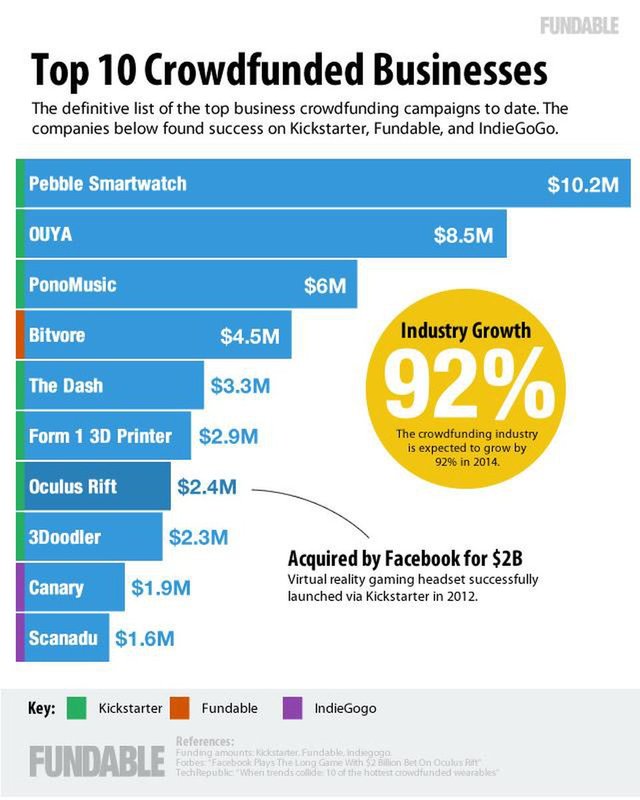
The list of succesfull crowdfunded business. Source: Forbes
The idea of crowdfunding opens entrepreneurial opportunity from exclusive & limited oligopoly to decentralization. As what has been shown by the statistics, crowdfunding can fill funding gaps, validate product ideas and create significant values for communities. A company that borns from crowdfunding, have also become a billion company, such as Oculus Rift and Pebble Smartwatch.
Crowdfunding also provides the opportunity to under-represented groups, who have difficulties accessing the capital or liquidity that they need to run and start their business. To put it simply, crowdfunding is a great idea, which can help a lot of people and benefits the society in general if we have the right platform to do it.
The Problems
Just like any other traditional business platform, there is a lot of problems in the current crowdfunding industry. One of them, and sadly the most urgent problems that need to be solved is the trust issue (which is kinda interesting, as blockchain and cryptocurrency were born in order to make everything trustless).
In the current crowdfunding platform, backers (people who give funds to a project in order to support them and gain benefits from it) are repeatedly being disappointed by creators because they fail to deliver their promise. There is not yet a viable solution in order to protect backers from losing their funds because creators keep failing or didn't work on their project seriously. Transparency is almost never there.
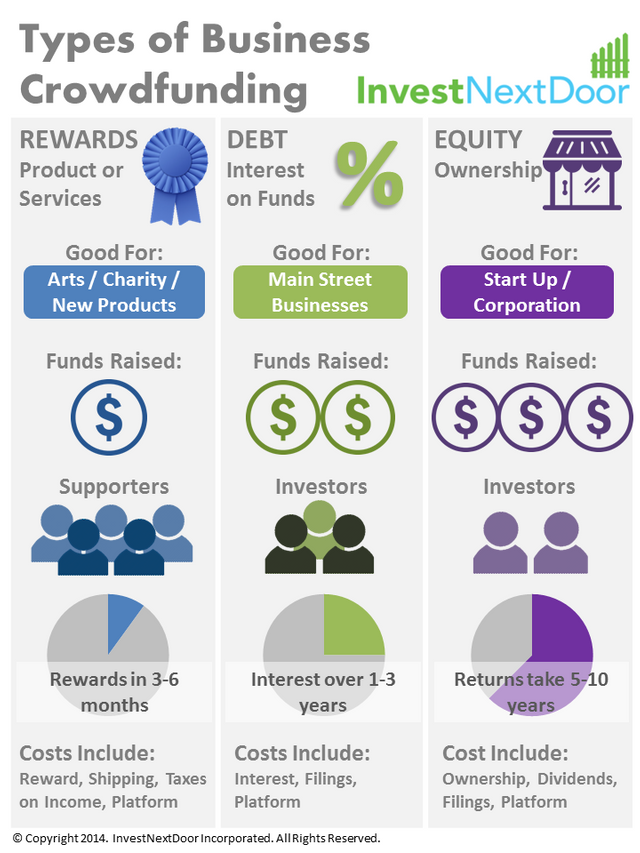
Several kinds of crowdfunding. Source: Crowdfundsuite
As statistics shows, there are almost 85% projects that delay from their milestones while 14% fail to run in Kickstarters. This is a chronic problem that needs to be solved asap in order to return investors or backers trust to crowdfunding. At this moment, statistics show that less than 1/3 backers never return to support a second campaign, which statistically speaking, more than 60% backers got disappointed on their previous projects that probably fails to deliver their promise.
It's quite ironic as it seems funding is merely considered as a donation and creators can use that money as they like, while backers expect them to use the money just like any business who are backed by stakeholders. On the other hand, crowdfunding platform doesn't have any protective measures to protect backers or other stakeholders.
Why do such things happen? The most understandable reason is that the incentive is aligned so poorly, with everyone only act to pursue their goal without realizing that others got burned because they did that. And that is why Kickstarter has a negative growth this year because they fail to protect their backers.
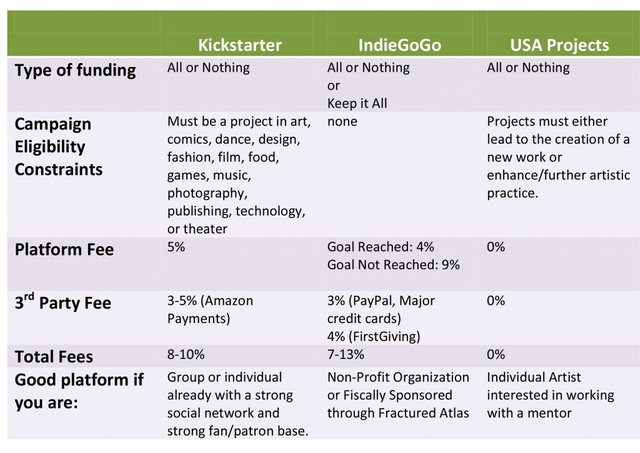
Comparisons on several traditional crowdfunding platform. Fees are relatively high. Source: Azarts
A traditional platform like Kickstarter only focuses on campaign success, because when that happens they can get more than 5% fees, which is not small. In other words, as long as the campaign succeed, Kickstarter has already got their money, while the product development and backers frustration are now out of the equation. Because both the platform and projects are paid upfront, backers are the one who has to sustain the never-ending disappointment from creators.
Not only that, but they also have to manage opening up to 22 bank accounts in many countries to ensure that they can accept money from as many people around the world, that is very complex and costly. Ironically, there is still a lot of underbanked people, even 63% millennials in a developed country don't have any credit cards.
The Solutions
How to solve the trust issue? As you might guess, blockchain and smart contracts will take the key role here. With the ability to force the deals for every participant, and to apply specific thing to happen, a smart contract is an ideal solution. The problem is, how can you execute it to make sure there will be no more problem?
Pledgecamp aims to use blockchain and smart contract to introduce a backer insurance, a security mechanism aimed to protect backer's funds in a smart contract. It will be governed by backer votes. In other words, the creators won't get 100% funds in front, but they'll have to achieve several milestones or do something in order to unlock the funds that they get from the backers. You can imagine this as a partial-progressive funding where stakeholders will need to ensure that creators do something before fund them an extra money.
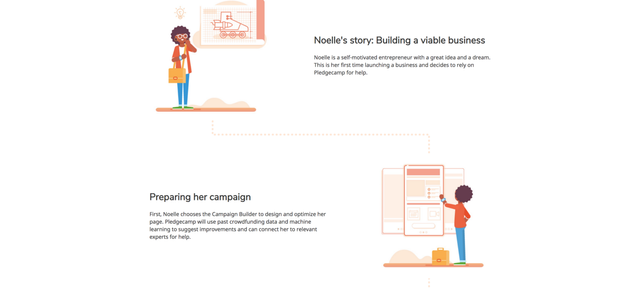
Pledgecamp from the perspective of a creator
This mechanism goal is to make sure that creators works and backers funds won't go to waste. If the creators decided to abandon it, then their deposited Pledge Coin will be used to refund the backers. This is to ensure that even the creators won't run away at the beginning of the campaign, because they also risk losing something here. Because the nature of the backers is supporters of the campaign, it is highly unlikely that they'll vote to make the creators suffers.
Backers will get their funds proportionally to the backer insurance offered by the creators if they decide to stop supporting the campaign in the middle of it. While they don't get a full refund, at least it is better than having dead projects or get a headache because you can't get your funds back from a never-ending delayed project.
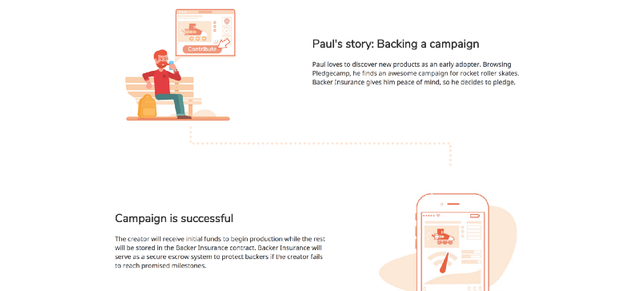
Pledgecamp from the perspective of a backer
In order to start a campaign, everyone can deposit Pledge Coin and they have to adhere to community rules which are agreed in a democratized by and can be amended by vote of users on the platform. Because of this, there won't be a single point of failure and everyone is responsible to make sure that only legit campaigns are listed on the platform. In fact, finding a scam or red flags will allow users to get PLG as a reward for their contribution. The PLG coins from campaigns that got removed as per community agreement will be returned back to the community as a reward.
Pledgecamp will also introduce "Smart Crowd", a way to participate in a campaign with your skills. Smart Crowd will help creators to find help or professional who has time to help them develop their product. It allows contributors to get rewarded in forms of Pledgecoin. Because of this, even contributors will also get incentivized rather than being left out after they've contributed to the projects. This is a nice idea, and very helpful, especially for creators who have troubles finding partners who are able to help them with their skills.

Pledgecamp from the perspective of a contributor
As you might see from the above descriptions, there is a correctly aligned incentive for every stakeholder. Even the Pledgecamp itself won't get money from fees as the fees are collected and earned by users who maintain and serve the network. In fact, Pledgecamp will have to ensure that they can create revenue by providing value-added services and help the project in order to successfully deliver their promises. In other words, every participant in the Pledgecamp ecosystem will try to pursue their own goal, but they'll only be able to reach it when they're contributive to the whole ecosystem and adhere to the rules, which in turn makes sure that everyone will gain the maximum benefits.
To sum it up, here are the benefits of the Pledgecamp ecosystem:
- Backers will be protected from financial loss while at the same time the possibility to receive the actual product will increase. They'll have another media to funds project via cryptocurrency and saves a lot of cost and time.
- Creators will be able to access a transparent funding source, with the opportunity to get help from contributors or the platform itself in order to reach their milestone. They won't have to pay high fees, and overall cost will decrease.
- Crowd or contributors will be financially rewarded for their participation in the ecosystem, such as finding frauds or contributing to project development.
Competition Analysis
There is another project that aims to mix blockchain and smart contracts in the crowdfunding industry called Coinchase. However, it is limited to crypto startup and it basically works like an ICO platform. Contributors will send ETH to the contribution address and after that, the team will work as usual. It introduces a break insurance policy, which basically said if the token price of the project falls below the ICO price in 48 hours after the listing, contributors can request a refund.
I personally think Pledgecamp has a competitive advantage over this project, for several reasons:
- Pledgecamp is more open to any business, and you don't necessarily have to run ICO projects in order to get funded via Pledgecamp, even though the way to contribute is via cryptocurrency.
- Backer insurance model is more sustainable in the long-term compared to the break insurance policy. Break insurance policy only focuses on short-term gains of the token price, while it doesn't guarantee that project will succeed and if you put it in another point of view, only introduce a pump scheme by the projects to ensure that token price won't fall below ICO price for 48 hours. After that, they can just leave the project or simply said the development will get postponed and so on.
- There is no way for contributors to get involved further in the campaign in Coinchase, while Pledgecamp allows to do it.
To put it simply, I think Pledgecamp is much more competitive in its model compared to Coinchase. What's your opinion? Let me hear it on the comments below.
Conclusion
The crowdfunding industry is flawed. Blockchain and smart contracts might be the key solution to fix it, but it always depends on how we will utilize it. Pledgecamp might not be the first one who tries to use blockchain and smart contracts to solve it, but it is definitely the first who can come up with a nice mechanism. It is definitely worth to check it out.
See these links below for more information about Pledgecamp:
- Pledgecamp Website: https://pledgecamp.com/
- Pledgecamp Whitepaper: https://pledgecamp.com/__pdf/whitepaper-pledgecamp-9-23.pdf
This article is created in exchange for potential rewards from Pledgecamp as a contribution to their bounty program on Bounty0x. The writer username on Bounty0x is joniboini. Readers are suggested to read the resource on their own and do their own dilligence.
To listen to the audio version of this article click on the play image.

Brought to you by @tts. If you find it useful please consider upvoting this reply.
Congratulations @littlejohn16! You have received a personal award!
Click on the badge to view your Board of Honor.
Do not miss the last post from @steemitboard: